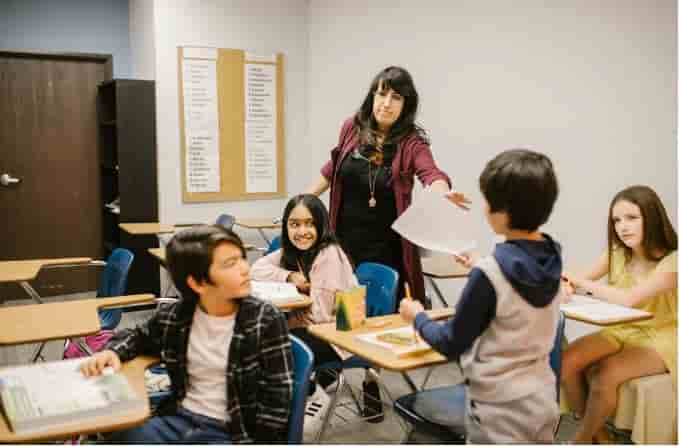The child hits the crucial stage in developing reading and writing skills, through which he or she sets very early foundations for learning. This article will focus on how to promote literacy in early childhood, why it is important, how to promote literacy in the classroom, early literacy tips for parents, and early literacy skills in young members of the community.
However, let’s start to learn about the essential points of promoting literacy in early childhood.
Tips on How to Promote Literacy in Early Childhood:
To teach literacy skills to young kids is very significant work. However, learning some strategies to promote literacy in early childhood can make your duties easy and comfortable.
1. Create a Literacy-Rich Environment
An environment rich in literacy will greatly contribute to the development of early literacy skills. Fill your home or classroom with age-appropriate literature, colorful posters, and engaging alphabet charts. Label everyday objects with their names to encourage word recognition. It will help stimulate exploration in children.
2. Read Aloud Daily
Read aloud to your children. This is probably one of the most common and effective methods to promote literacy. Pick books that are simple, but have been designed with colorful pictures to catch little eyes. Leave the voice sounding animated while telling the story. However, encourage children to ask questions and discuss with you the story. Finally, vocabulary, comprehension, and listening abilities will be improved.
3. Encourage Storytelling.
Children develop their imagination and skills to communicate through storytelling. They can try to build their stories by using pictures or toys. Alternatively, they should be encouraged to narrate their day. Great for encouraging creativity and most of all effective in helping to develop listening and speaking skills.
4. Introduce Phonics Early
Phonics teaches children about the relationship between letters and sounds. Fun songs, rhymes, and even games could be nice introducing phonics. Simple activities might include matching letters to sounds or practicing blending sounds; they’ll enable early literacy skills to grow.
5. Provide Writing Opportunities
Let children scribble, doodle, and write freely. Give crayons, pencils, and paper for free expression. Praise them for their attempts, even if it isn’t quite “right.” Activities such as tracing letters and copying simple words build fine motor skills and confidence.
6. Make Literacy Fun
Let learning become fun and pleasurable for children from the very first stages of their lives. Educational games with puzzles and well-designed interactive apps should help for easy learning. Sing songs that have rhymes, creatively play word games, and praise small milestones. That fun approach means capturing the children’s minds and hearts so that they will not feel bored or demotivated.
7. Build a Routine
Make the literacy activity a daily habit. Set aside particular times to go for reading, writing, or even storytelling. Such routine creates that aura of expectations and illustrates to the child what literacy entails.
8. Engage in Conversations
Regularly speak with a child to encourage language development. Ask open-ended questions and prompt some of their thoughts. With such daily conversations, the child builds vocabulary and communication skills.
9. Visit Libraries and Bookstores
Take the kids occasionally to go around bookstores or libraries. Let them see all of the books open to them and choose those they prefer. Story hours or literacy events encourage being read to from an early age.
10. Be a Role Model
Imitation is the greatest compliment. Children observe adults, so they should be able to see that reading and writing are valued and very important. Let them share some of their favorite books and stories with their parents; their joy will be contagious.
Following these strategies about how to promote literacy in early childhood, teach young learners literacy easily and become successful.
Recommended reading: lack of parental involvement in education
Why is early literacy important?
Now you can think why early literacy is important. There are some important reasons for this. If you follow the importance of early literacy and how to promote literacy in early childhood, you can understand it very readily.

Importance of Early Literacy for a Child’s Life
- Develops Effective Communication Skills:
For early literacy, the child learns to express himself clearly. His speaking, listening, and comprehension are honed.
- Enhances Cognitive Development:
Through reading and writing, the brain undergoes development – particularly because of the activity. Most importantly, children learn the skills of thinking, reasoning, and problem-solving.
- Improves School Performance:
Children who have developed early literacy skills excel at school; quicker comprehension of lessons and mastery of reading and writing tasks become the norm.
- Builds Confidence and Self-Esteem:
Reading and writing empower children; to them, it is an achievement. Their confidence propels them to want to learn more.
- Develop an Entry Into Learning:
That sounds fun and creates a healthy basis for lifelong reading experiences: early exposure to books and stories makes learning fun; children will develop a lifelong love of reading and exploring.
- Provides Social Skills:
Literacy activities teach children to share ideas and interact with others. This will make them better.
- Prepares Future Success:
With great literacy skills, one may gain better access to even better education and job opportunities. Early literacy creates the foundation for future achievements.
- Creates Critical Thinking Skills:
Reading and storytelling make children question things and have creative thoughts. They learn to see, think, and analyze situations differently.
Early literacy is very important in the child’s overall development because it will have an impact on his academic, social, and emotional development which is a prerequisite for a prosperous future.
Recommended reading: how to socialize for introverts
How to promote literacy in the classroom?
Literacy encourages students to learn and is important in the classroom. Additional ways of how to promote literacy in the classroom are as follows:

- Read Aloud: Reading books at regular intervals for students makes them listen to accurate pronunciation and new words impinging their minds.
- Interactive Discussion: Let the student talk and voice their opinion about the stories seeing or hearing. Ask them things that would make them think about the material.
- Daily Reading Time: Designate an hour every day where children can spend simply reading on their own. It would allow them to practice alone.
- Use of Visual Aids: Word charts, Posters, Flashcards. These signify anything printed for the pupils, that aids learners in putting words with meanings.
- Create a reading corner: A small snuggle place with books that are easily reached by the kids. Fun and friendly reading.
- Student Write Everyday: Students should write every day. This may include journal writing or short story writing. Writing reinforces reading.
- Phonics and Word Games: Activities with a clear focus on letter sounds and word recognition using games.
- Varied Reading Resources: Different reading materials allow different genres of books and different topics as well as maintain student interest to learn more.
By using these strategies on how to promote literacy in the classroom, students will develop stronger literacy skills in a supportive classroom environment.
Recommended reading: how to create an inclusive learning environment in the classroom.
Early literacy tips for parents
If the parents want to know how to promote literacy in early childhood, then, some important early literacy tips for parents can make their effort quick and simple.
Here are some early literacy tips for parents:
- Everyday reading: Schedule time to read with your child. Even short sessions help.
- Make it fun: Use animated voices and point at pictures. It keeps them engaged. The same goes when reading- ask very simple questions, “So what do you think happens next?”
- Point to words: Teach your child that words are read from left to right.
- Use everyday moments: Label objects around the house. New words are learned that way.
- Singing: Rhymes and songs help the children hear it.
- Word Games: Play simple games like” I-spy”, to enhance vocabulary.
- Encourage storytelling: Ask your child to tell you a story. This helps develop speaking skills.
- Read the same book often: Repetition of stories broadens understanding and memory.
- Library visit: Let your child go to the library and explore books. It sparks interest in reading.
These early literacy tips for parents create a solid foundation for your child’s literacy development. Make it enjoyable and consistent and master how to promote literacy in early childhood.
Recommended reading: small group learning strategies for making the lesson successful.
What are Early Literacy Skills?
Early literacy skills are the basic skills necessary for children that will help them in reading and writing. It enables children to comprehend the language to embark on their journey toward reading and writing. So, learn early literacy skills and develop your skills on how to promote literacy in early childhood.
1. Listening and Understanding
Children learn, first of all, to listen to the words. By listening, they can learn how language works and, by extension, ideas. They can follow simple commands, make out sounds, and know stories.
2. Speaking
It helps a child be expressive through the use of simple words and sentences. The more a child talks, the better the vocabulary grows because all the talk has to be and they have to learn how to use words right.
3. Phonemic Awareness
The ability to hear and understand sounds in words is known as phonemic awareness. Children can identify the beginning sounds, middle sounds, and ending sounds. They can also break words into small sounds. This will help them understand how letters and sounds go together.
4. Knows the Alphabet
In this case, it is children who know the letters by name and sound and recognize both upper-case and lower-case letters. The knowledge of the alphabet is helpful especially when it comes to reading and writing.
5. Print Awareness
Print awareness tells that the writing carries meaning. Kids learn that books and words tell stories. Moreover, they learn to recognize a letter, a word, and a sentence that is printed.
6. Vocabulary Development
It’s learning that a wide range of vocabulary is required to understand a tale. By hearing words spoken and reading books, children learn new words. The greater the word knowledge, the easier it should be for any reading comprehension.
7. Comprehension of Story
Both children learn about events from stories, characters about characters in the event, places within the story as well as the events themselves to predict what might happen afterward.
8. Writing Abilities
Drawing figures and scribbling is the start of writing. After that, they will learn to write letters and words. This way, writing is designed to teach children how letters and words fit together, creating meaning.
9. Letter-Sound Correspondence
This provides an internal conceptualization of how letters are associated with certain sounds; this association serves as a prerequisite for reading and spelling.
10. Rhyming
Rhyming trains them to hear common sounds between words and later enables them to decode words more easily when reading.
They are basic skills in literacy early, which, besides reading and writing, are to be learned through careful comprehension of some workings of language and confidence as it delves into a reading adventure. Children, by practicing these skills, will be good readers and writers.
Recommended reading: how to improve social skills for teenagers
Final Thought on How to Promote Literacy in Early Childhood
Understanding how to promote literacy in early childhood is essential for every parent, teacher, or caregiver. By creating a supportive environment, making learning fun, and being actively involved, you can lay a strong foundation for a child’s literacy journey. Start early, stay consistent, and celebrate every small achievement.
FAQs on How to Promote Literacy in Early Childhood
1. How can we promote literacy in the early years?
For early literacy promotion, read out to children, storytelling, picture books, word games, talk more often, label objects, and introduce letters and sounds through fun activities.
2. How do you teach early childhood literacy?
The teaching of early childhood literacy is reading to children daily; using simple books with pictures; the recognition of letters and sounds; and playing word games or singing songs to develop their language skills.
3. What activities promote early literacy?
Reading aloud, singing songs, and playing word games would strengthen early literacy. Storytelling, letter recognition, and shape drawing all contribute positively to the development of reading and writing skills.
4. How do you strengthen literacy in early childhood?
To strengthen literacy in early childhood, read together every day, talk about books, encourage storytelling, sing songs, play with letters, and provide a print-rich environment and productive, funny learning activities for the kids.
5. Why is literacy important in the early years?
Early literacy prepares children for the most critical verbal communication development that will foster brain growth. It provides a very solid basis for learning, including reading, writing, or problem-solving, which shapes future successes.
6. What are examples of early literacy skills?
Some examples of early literacy skills include: recognizing letters, understanding sounds, learning to rhyme, recognizing words, holding a book properly, listening to stories, and speaking freely. All these skills help children in both learning to read and write.
7. How does a teacher promote literacy in the classroom?
A teacher would promote literacy by reading aloud, encouraging discussions, using visual aids, lending books, and helping students practice writing. Make a reading environment positive.
8. How can parents promote early literacy?
Read every day to the child. Use bright books. Sing nursery songs. Talk to them frequently. Teach the letters of the alphabet. Play games with words. Encourage scribbling. Create an environment that makes reading fun. Limit time spent on electronics. Have patience.
9. How are parents involved in early literacy development?
Every day, parents read aloud to their kids, engage in conversation with them, and give them books. As well, parents encourage their children to write, play games related to words, and create a print-rich environment at home.
10. What do parents need to know about literacy?
The parents have a major role in building up skills in literacy. Read the child daily. Encourage storytelling. Make an environment rich with print. Ask questions during reading. Celebrate success. Make learning fun and interesting.
Recommended reading: Thanksgiving social skills activities

I am a content writer and English educator with over 10 years of professional experience. With a master’s degree in English Language and Literature, I specialize in creating educational content that is clear, practical, and easy to understand. As the founder of TakeEasily.com, I’m dedicated to helping students, parents, and teachers with valuable learning resources and insightful guides.


1 thought on “10 Tips on How to Promote Literacy in Early Childhood”